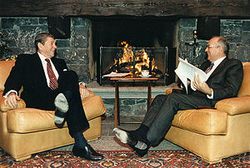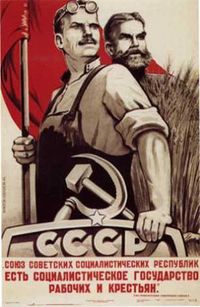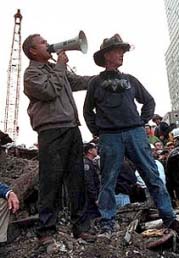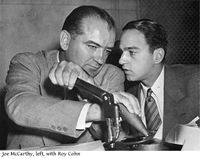Think of this as Volume 15, Number 3 of A-Clue.com, the online newsletter I've written since 1997. Enjoy.

Everyone who engaged in it knew what they were doing was important. Those who opposed either war, like Clement Vanlandingham or Charles Lindbergh, were swept away and the movements they represented tossed down the memory hole.
The Cold War was different.

There was never the kind of absolute unity the Cold War's proponents demanded. Yet we won.
Since the height of the Vietnam war protest movement, I believe America has been engaged in a Civil Cold War. Like that other Cold War, it is mainly fought by proxy. Those behind the struggle never suffer, seldom die. That's the proxies' job. You don't become a hero by dying for your country — you become one by making the other son of a bitch die for his country.
What caused the Cold War was a struggle over resources. Two incompatible ideologies both believed themselves surrounded by the other, both felt about to be strangled. The battle was not just over physical resources like oil, but human capital as well. Bringing people into your own camp, training them in the way leaders felt they must go, was deemed the measure of success.
We learned through this struggle the limits of control. A government may hold its peoples' bodies, but it cannot compel their imaginations. The war came to a close as economic change made the power of human imagination paramount. The capitalist model crushed the communist one because it could better adapt to economic change, because its incentives compelled people to grow and produce more efficiently.

The American Civil Cold War began when Americans became divided over the other Cold War. When young people tuned in, turned on, and dropped out, those who believed that only absolute unity could bring victory (which was true in World War II) fought back with everything they had. And when one domestic victory (over the hippies) was won, other enemies were created — college professors, journalists, all the movements that arose through the 60s. When the triumph over any one group became absolute new enemies had to be created. Gun control. Abortion. Background checks. Contraception.
This was especially true after the Cold War itself ended. A political movement based on Cold War, on identifying and crushing internal dissent, could not abide the idea of civil peace. So while Dick Cheney and his buddies went off to dream of Osama bin Laden, we had Ruby Ridge, and Waco, and Oklahoma City. We had the War Against Clinton, the Contract with America. We had Civil Cold War for its own sake.

We have acquired a pet troll here on this blog, who comments under the screen name Peng. (Note that he's afraid to use his real name.) Everything he writes here drips with scorn. In a recent post (on an unrelated topic) he calls our President "Mustafa HopenChange" and condemns "the bloodsucking lazy liberals who need to grow out of their seventies ideologies." (By which he means me, or anyone who reads what I write with anything approaching approval.)
Most of his comments are of the same ilk. He's fighting the battles of the present with the language of the past. He sees me as an enemy of America, the President as an enemy of America. Facts don't sway him (like the fact that the present deficit was created by George W. Bush's tax cuts and unpaid-for wars). The only thing that matters is destroying the internal enemy. Somehow, he thinks, if all liberals were done away with, if everyone thought as he does, that something called "victory" would magically appear. But it wouldn't. He'd just have to find someone else who was ideologically impure and go after them. Poor people, maybe. The economically non-competitive. Non-fundamentalist Christians. RINOs. That's the way ideological movements work. Without something or someone to oppose they collapse of their own weight.

But how can this American Civil Cold War end? The first one ended when the economy changed, when the constraints of manufacturing gave way to the abundance of Moore's Law, when culture and trained, eager minds became our chief economic good.
So it is with this war. The American Civil Cold War has survived for 43 years because of scarcity. Specifically the scarcity of oil, natural gas, of coal, of energy derived from caveman tech, finding stuff we could burn. Our proxy wars were driven by scarcity, our global alliances were driven by it.
Never mind that in the last decade that scarcity has actually been controlled by Arabs and Russians and Venezuelans who either were our enemies or were bankrolling them. It was "keeping up the skeer" that was most important, not whether the argument made any logical sense. It's devolved in our time into a burlesque version of Mao Zedong's Cultural Revolution, with liberals as the enemy. And we must have enemies, for without them we can't keep fighting.
But if you eliminate the scarcity you eliminate the cause of the fight. If energy is no longer something you must fight over, if you're harvesting the energy all around you rather than pulling it up out of the ground to burn it, then political priorities change. There's no longer anything to fight over. In fact, the fight itself becomes counter-productive, because the chief asset of the nation becomes its ability to invent new harvesting techniques and put those techniques into mass production. Just as with the first Cold War, the American Civil Cold War ends with the rise of a new Creative Class.


The purpose of speeches like the recent address in Tucson is to push this Thesis of Consensus. Pundits compared it with Lincoln and Reagan because they understood this as its purpose. Like Lincoln's the speech is a masterpiece of verbal craftsmanship. Like Reagan's the delivery is understated — you let the script do the work. Like both, it called on Americans toward the better angels of our nature, explicitly turning a 9-year old killed by tragedy into an angel, and calling on the rest of us to be worthy of her in how we conduct ourselves in the public debate.
The Obama Thesis is not Left and it's not Right. It's less about the what of our politics than the how. Yet it is truly transformative, and it's the change we most need. It won't end Peng's wrath, any more than Abraham Lincoln did Nathan Bedford Forrest's. But it will, in time, cause the rest of us to turn away from his anger, the anger of all who argue as he does, and to once more argue ideas and proposals instead of people and ideology.











Hey… the honor! You said you were ignoring me. But that’s not exactly what you’re doing here Dana. You do realize that I hope?
It’s a good day.
Hey… the honor! You said you were ignoring me. But that’s not exactly what you’re doing here Dana. You do realize that I hope?
It’s a good day.
cold calling sales training
Dana Blankenhorn: The American Civil Cold War
sales motivational speaker
Dana Blankenhorn: The American Civil Cold War
mouse click the next article
Dana Blankenhorn: The American Civil Cold War